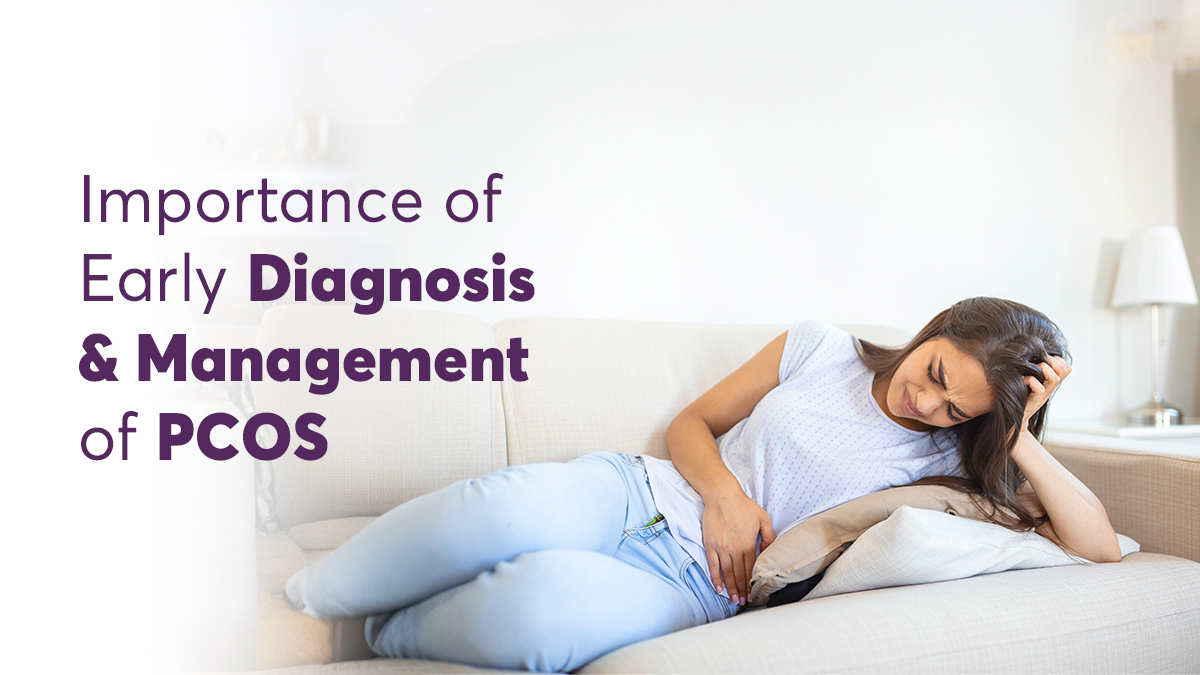Importance of Early Diagnosis and Management of PCOS

Did you experience any sudden, unexplainable weight gain or hair growth? Maybe you have irregular or missed periods? These could be signs of PCOS. While 8%-13% women of reproductive age globally suffer from PCOS, as per WHO estimates, as many as 70% of them go undiagnosed. Although there is no cure, it can be treated and controlled. The first step is to know the symptoms. This might lead to early diagnosis and treatment of PCOS.
First, let’s understand the difference between PCOS and PCOD. They are very similar, as both affect your hormonal and emotional well-being. They can lead to various long-term health problems if left untreated.
PCOD: In this, the ovaries release eggs before they mature, leading to hormonal imbalances and swollen ovaries.
PCOS: In this, ovaries produce excess androgens due to endocrine issues. This can make the eggs turn into cysts.
Since the early symptoms may differ, both PCOS and PCOD are difficult to diagnose and manage.
What is PCOS?
Are you a working woman, living in the city? Polycystic ovary syndrome is among the most common lifestyle diseases affecting urban, middle-class, and professional women. This condition manifests itself in different ways, which is why PCOS symptoms can vary. A combination of these symptoms could indicate PCOS:
- Observable PCOS Symptoms
- Absent or irregular periods
- Intermenstrual bleeding
- Severe or adult acne
- Excessive body and facial hair (Hirsutism)
- Male-pattern baldness and hair thinning
- Weight gain (especially in the belly) or difficulty in losing weight
- Chronically poor gut-health
- Darkening of the skin with a velvety texture
- PCOS Symptoms that are Detected Only with Medical Diagnosis
- Excess androgen
- Ovarian cysts (polycystic ovaries)
- Hormonal imbalances
PCOS May Lead to Many Diseases
The biggest issue with PCOS/PCOD is that they can lead to the following health conditions:
Infertility
- Depression/Anxiety
- High blood pressure (hypertension)
- Type 2 diabetes
- Fatty liver disease
- High cholesterol
- Cardiovascular issues (heart diseases)
- Endometrial cancer (cancer of the inner lining of the uterus)
What Causes PCOS Among Women of Reproductive Age?
While PCOS/PCOD is often hereditary, there are a couple of other triggers:
Insulin Resistance:
This may cause your body to produce excess male hormone (androgens) and lead to the thickening and darkening of skin around the groin, armpits, or napes, giving it a velvety texture. This creates a hormonal imbalance that can trigger PCOD.
Low-Grade Inflammation:
This refers to your body producing white blood cells as a natural response to injuries. Chronic low-grade inflation may cause the ovaries to overproduce androgens. This can also impact your heart and blood vessels.
Benefits of Early PCOS/PCOD Diagnosis
After an early diagnosis of PCOS/PCOD symptoms, you can make lifestyle changes and manage your diet to prevent health complications later in life. Consulting your doctor can help you manage your recurring symptoms better and know when the issue is affecting your mental health. Timely PCOS treatment can help regularise your periods, one of the most common symptoms, and minimise other symptoms. In the long run, this helps improve the chances of pregnancy and reduces vulnerability to various diseases.
How is PCOS/PCOD Diagnosed?
Due to a wide spectrum of symptoms, there is no one test for PCOS diagnosis. There is no PCOD profile test either. Here’s a look at the combination of tests used for PCOS diagnosis:
Blood work:
Hormonal profile, cholesterol levels, and glucose tolerance.
Physical tests
Pelvic exam by a medical practitioner and observing physical symptoms like body hair, hair loss, skin discoloration, and unexplained weight gain.
Ultrasound:
This accurately detects any ovarian swelling or cysts.
One key challenge in the early diagnosis of PCOS/PCOD is that the symptoms accompany and overlap with the signs of puberty. This makes having regular doctor visits even more important.
PCOS Management Strategies
PCOS is a lifelong disease, but it can be managed. A healthcare professional can create a personalised plan, taking into account the severity of your condition and other health parameters. Making lifestyle changes is the first line of PCOD management. This includes:
- Exercise
- Diet
- Weight management
- Taking supplements (if necessary)
Following the regimen set by your doctor can improve your hormonal balance and prevent susceptibility to fatty liver and insulin resistance. Remember that PCOS treatment may differ if you’re planning to conceive or need to lose weight.
Importance of Monitoring PCOS and Ongoing Care
The regular monitoring of symptoms and ongoing care are imperative for PCOS/PCOD management. Your doctor will tell you the PCOS symptoms to monitor as well as suggest changes in your diet and exercise routine when required. Continued care can considerably improve your physical, hormonal, and emotional health.
We understand that dealing with PCOS symptoms can be stressful and sap your energy. But early diagnosis and ongoing care can significantly reduce long-term health risks and give you more peace of mind. The proper management of PCOS symptoms can also help reduce the need for fertility treatment.
FAQs
Q: Can PCOS be treated if diagnosed early?
A: While there is no cure for PCOS, early diagnosis allows for effective management and treatment of the symptoms. Identifying PCOS early enables individuals to make necessary lifestyle changes and seek medical interventions that can regularize menstrual cycles, improve hormonal balance, and reduce long-term health risks. Early treatment can also help manage symptoms like weight gain, acne, and excessive hair growth, significantly improving overall well-being.
Q: What is the earliest age to diagnose PCOS?
A: PCOS can be diagnosed as early as adolescence, often around the time when a young woman starts menstruating. However, the symptoms of PCOS can overlap with those of puberty, making early diagnosis challenging. It is crucial for young women experiencing irregular periods, severe acne, or other related symptoms to have regular medical check-ups. This helps in the timely identification and management of PCOS, ensuring better health outcomes in the long run.
Q: Can egg quality be improved in PCOS?
A: Yes, the quality of eggs in women with PCOS can be improved through various management strategies. Lifestyle changes such as maintaining a healthy diet, regular exercise, and weight management play a significant role. Additionally, medical treatments prescribed by a healthcare professional can help regulate hormonal imbalances and improve ovulation. For those seeking to conceive, specific fertility treatments and medications may be recommended to enhance egg quality and increase the chances of successful pregnancy.










